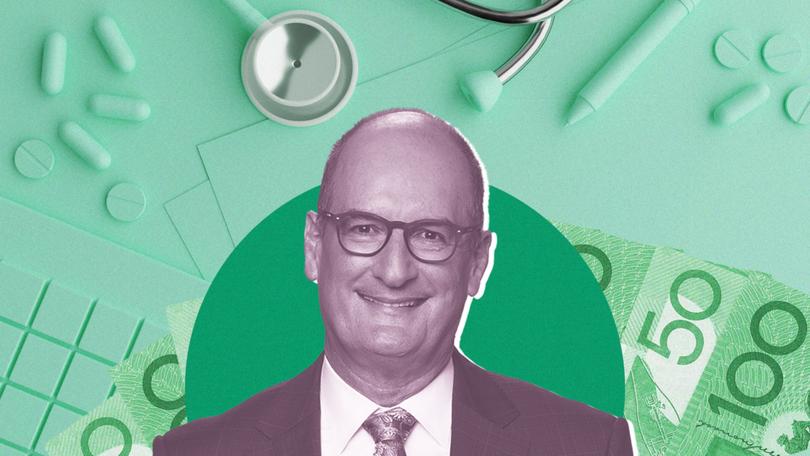David Koch: How much your health insurance premiums are rising and what you can do about it
At a time when the economy is sagging and household budgets are being squeezed, rising health insurance premiums are the last thing Australians need. Here are the key things you can do to avoid paying too much.

At a time when the economy is sagging and household budgets are being squeezed by high inflation and interest rate increases, this week’s Government-approved lift in health insurance premiums on April 1 is the last thing Australians need right now.
The fact the announcement was delayed until after the Dunkley by-election, and just three weeks before the increases flow through, is proof even the Government knows how sensitive these premium rises are to the electorate.
If you’re one of the 14.7 million people covered by private health insurance, you have just over three weeks to fight back and reduce the pain.
Sign up to The Nightly's newsletters.
Get the first look at the digital newspaper, curated daily stories and breaking headlines delivered to your inbox.
By continuing you agree to our Terms and Privacy Policy.First of all, understand the Government’s 3.03 per cent rise in premiums is an average, it’s not a blanket rise.
Some private health insurers will be lifting premiums higher than the 3.03 per cent while others will be lower.
Even within the health insurers, some plans will rise higher than others.
I’ve heard of some funds notifying clients of a 10 per cent rise in premiums. Your insurer will notify you of your increase over the next week or so.
But as a benchmark, the biggest premium increases are from these insurers:
- CBHS Corporate Health (5.82 per cent)
- CBHS Health Fund (4.51 per cent)
- nib (4.10 per cent)
- HBF Health (3.95 per cent)
- Health Insurance Fund of Australia (3.87 per cent)
While the private health insurers passing on the lowest premium rises are:
- Health Care Insurance Ltd (0.27 per cent)
- Defence Health (1 per cent)
- Australian Unity Health (1.42 per cent)
- Peoplecare Health (1.63 per cent)
- Health Partners (1.93 per cent)
As you can see there are big differences. So it pays to give your current private health insurance policy its own financial health check to see if it’s still the right policy for you and whether there are better deals out there.
First of all, make sure your private health insurance cover still suits your individual needs and stage of life.
Being a “senior” citizen I always had the top gold cover because I figured I’d need it as I aged.
That was until my wife, Libby, pointed out that it included obstetrics (we’re a bit past that). On top of that (brace yourself) we had extras cover for orthodontics.
After a quick audit of the cover we needed we settled on silver plus and saved a fortune in premiums. When was the last time you looked at the actual services covered in your policy?
Many people are scared to change their health insurer if they’ve developed a medical condition and another insurer either won’t cover them or charge them a huge premium.
It’s understandable because home and contents insurance premiums depend on your risk profile — whether you live in a bushfire, flood or dangerous zone.
But private health insurance cover is not risk-rated, it’s community-rated. So no matter what ailments you have your premium is rated exactly the same as anyone else of your age. So switching to another provider shouldn’t be a problem.
Another misconception about changing health insurers is that you’ll have to sit through a waiting period before being eligible for some coverage.
Not necessarily. If you switch to the equivalent cover (or lower cover) with another provider, no waiting periods apply. If you switch to a higher level of cover then waiting periods may apply.
But at this time of year, a range of private health insurers will offer attractive incentives to switch insurers which includes waiving waiting periods even if you opt for a higher level of cover.
It is so easy to compare your health insurance coverage these days using one of the online comparison websites.
I know a lot of people are tempted to just ditch private health insurance altogether and pay the Medicare Levy Surcharge on those earning over $93,000 a year and $186,000 for a couple. Do your sums carefully first. Depending on your income tax tier, ditching could cost more.
Basic hospital cover will help you avoid the Medicare Levy Surcharge but, for a bit extra, you could get a lot more coverage by choosing a bronze policy.
Be careful because cheaper “extras” health cover won’t offset the levy.
A bloke this week was telling me he was avoiding the MLS with a cheap “extras, dental” policy.
You should have seen his face when I said it didn’t qualify and for the last five years, he had unknowingly been paying the surcharge without knowing it.
I know private health insurance can seem complex, and there are a lot of misconceptions around it, but it is worth using the next three weeks to review your cover to make sure you’re not paying for services you don’t need.
